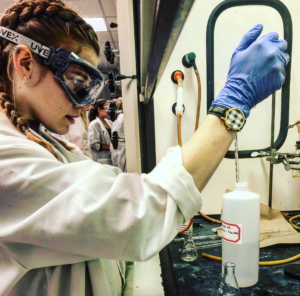I had the opportunity to speak with Therese Weidenkopf concerning her research experience with Dr. Hughes concerning the development of a methodology for the synthesis of the semiconductor nanocrystal CIS.
Can you describe what your research project is about?
My research involves the development of a methodology for the synthesis of the semiconductor nanocrystal CIS. Semiconductor nanocrystals, such as CIS, are involved in biolabeling techniques, such as fluorescent biolabeling and drug delivery. Unfortunately, the toxicity of CIS is not fully understood, nor is the ability to synthesis the nanocrystal in bulk and retain the stability and integrity if the nanocrystal for in vitro testing. The research I perform investigates potential methods of creating stable, water soluble CIS nanocrystals whose toxicity can then be determined by exposing zebrafish (Danio rerio) embryos to varying concentrations of CIS.
What made you decide to pursue your topic?
When I was accepted as a freshman to the Research Fellows program I was given a list of projects with the chemistry faculty that I could chose to pursue. I noticed that Dr. Hughes’ project dealt with nanocrystals and nanotechnology, which is a topic I have been fascinated with since growing up watching Iron Man. If I had the chance to learn how to synthesize and work with small electrical conducting, light emitting nanoparticles and ‘play’ Tony Stark, I was not giving up that chance. However, throughout the project it was heavily methodology development based which required many brainstorming sessions between me and several scientific papers. It has been a constant search for puzzle pieces as I continue to find and incorporate new information in my research which has been incredibly rewarding.
Why did you decide to do research?
I have wanted to become a physician since as early as I can remember, and not only did I want to experience the science of the body, I wanted to experience the science of the world. Performing research at Roanoke has introduced me to another scientific world in where I can feel magical by synthesizing small light emitting particles. Science is incredibly diverse and I believe that participating in difficult and academically stimulating research will aid my work as a physician.
How has your experience with your research advisor been?
It started off very intimidating. Dr. Hughes is an incredibly intelligent scientist and I was a young freshman desperately trying to understand P-chem. Even though I fell flat on my face many times, Dr. Hughes was always there to give me the tools to help me up. He consistently pushed me to stretch my scientific imagination and find the solutions to my research questions myself. Working with Dr. Hughes the past three years has not only cultivated and shaped my scientific mind, but it also has helped me grow in my character. He has always been there as a trusted advisor to talk about whatever I was struggling with in my life. He has supported me in my academic efforts and even attended my show when I was the supporting lead in TRC’s An Enemy of the People.
What has been your favorite or most interesting part of your research project so far?
My favorite part about my research project thus far has been the ability to attend and present at a research conference as an undergraduate. This past month I was able to attend a virtual conference sponsored by Harvard University where I presented my research to my peers and researchers from around the world. It was truly a unique experience because I saw the vast diversity of research projects that illustrated the inclusive nature of research and the level of thought, detail, and preparation that goes into every research project. I was also able to soak in the wisdom of the keynote speakers such as Dr. Sylvester James Gates Jr. and Nobel Prize Laureate Dr. Michael Rosbash.
What would you say to current and incoming students interested in doing research?
You may come into your research project feeling completely overwhelmed and afraid that the topic is far too advanced for you to understand. Take that fear and channel into a drive for success and a desire for understanding.
Lastly, any other additional information or comments you’d like to include besides the questions stated above?
Understand that your research advisor is there to help you. Build a relationship with your advisor. It does not always have to be about your research topic. Take advantage of their help and let it launch you into an abundance of opportunities.
